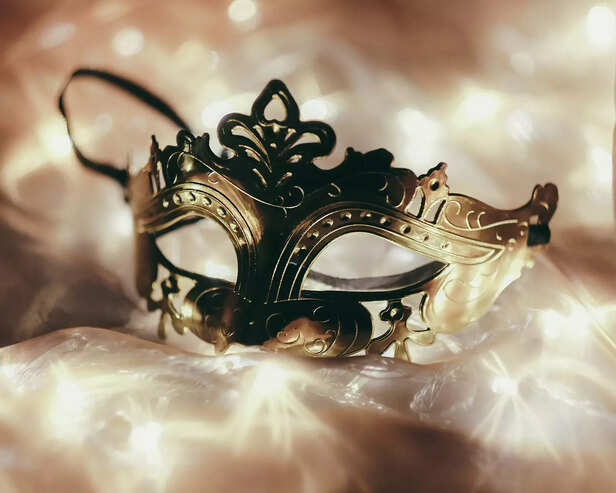The Friend Who Turns Enemy Was Never Your Friend: Chanakya Niti
Riya Kumari | Jul 16, 2025, 12:10 IST
( Image credit : Times Life Bureau, Timeslife )
Let’s set the scene: You're sipping overpriced coffee, mentally preparing to soft-launch your emotional availability on Instagram, when boom, betrayal. Not from the usual suspects (exes, HR, your internet provider), but from someone you swore would be in your wedding party. The kind of person who knew your secrets, your Spotify Wrapped, and probably your Netflix password.
A delayed confession. A quiet truth that finally stopped pretending. Some friendships die with distance. Others with time. But the most dangerous ones? They don’t die. They turn. There’s no fight. No final straw. No dramatic fallout. One day, it just shifts. Their words start to cut instead of comfort. Their presence begins to drain rather than support. Their loyalty? Reassigned. And while you sit there trying to figure out what went wrong, they’re already playing for the other side. Chanakya didn’t call this a tragedy. He called it a strategy. Because he understood something most of us only realize after being burned: The friend who becomes your enemy was never your friend. Not truly. Not psychologically. Not beneath the surface.
People don’t change. They reveal

We think people suddenly turn on us. Suddenly grow cold. Suddenly act like strangers. But “sudden” is just our perception. What we’re seeing now is likely who they’ve always been, we just didn’t want to believe it. We ignored the warning signs. We brushed off the comments that felt off. We excused the times they didn’t clap when we won. Why? Because we wanted them to be real. We wanted to believe in the friendship more than we believed in the truth staring back at us.
Most people don’t wear masks. They are the mask. You assumed closeness meant safety. You thought time meant loyalty. But human nature doesn’t work like that. People don’t reveal themselves in comfort, they reveal themselves in advantage. When they sense you have something to offer, they behave. When they believe you need them, they play nice. And when they think you’re no longer a threat, they start showing you who they actually are. What you mistook for friendship was proximity. What you thought was loyalty was leverage. And what you’re calling betrayal? That was simply their real face, finally allowed to breathe.
Enemies Don’t Arrive. They Evolve

Just because someone knows your pain doesn’t mean they’ll protect it. Just because they were there during your worst doesn’t mean they were rooting for your best. Some people stick close not out of love, but out of strategy. Because your openness gives them power. Your honesty gives them material. And your trust gives them access they haven’t earned. When their mask slips, it doesn’t mean something has ended. It means something has finally made sense. Nobody walks into your life wearing a villain badge. They arrive soft. Supportive. Familiar. But slowly, almost invisibly, their intent curdles. It happens in micro-moments:
What They Wanted Wasn’t Friendship. It Was Access

You didn’t lose a real friend. You lost the fantasy of one. And there’s peace in that. Because now, you stop explaining yourself to people committed to misunderstanding you. You stop defending yourself to someone who was secretly hoping you’d fail. You stop bleeding for someone who wouldn’t even offer a bandage. Sometimes closure doesn’t come with an apology. Sometimes it comes with clarity, the moment you realize they were never on your side.
People don’t always get close out of love. They get close to observe, to study, to figure out how you work. Because the closer they are, the more precisely they can damage you, if and when they choose to. Chanakya knew the difference between a friend and a familiar threat. And he warned us to never confuse shared memories for shared intentions.
Closure Is a Trap. Recognition Is Power

Chanakya was ruthless not because he lacked emotion, but because he valued clarity. He understood that protecting your peace means recognizing who’s real before you get too deep. His philosophy wasn’t about cutting people off. It was about keeping your soul intact. Because when you surround yourself with people who only look loyal, you build your life on a lie. So next time someone flips on you, don’t chase answers. Don’t beg for explanations.
You don’t need an apology from someone who practiced your downfall. You don’t need closure from a person who knew exactly what they were doing. You need recognition. The ability to look at a face you once trusted and see it clearly now. No illusions. No fantasies. Just pattern recognition. Chanakya didn’t ask you to be cynical. He asked you to be awake.
Some People Were Never With You, They Were Just Near You
We mistake proximity for connection. We confuse consistency for care. And then we’re shocked when someone switches, like betrayal is a glitch, not a design. But when someone turns on you, the real lesson isn’t about loss. It’s about clarity. Clarity that cuts through memory. Clarity that doesn't ask "Why did they do this?" but instead asks, “What did I ignore?” Because betrayal doesn’t break you. It reorganizes you. And if you let it, it’ll be the last time you ever hand the blueprint of your soul to someone wearing a smile they didn’t earn.
Everyone teaches you how to make friends. No one teaches you how to see through them. Chanakya did. And once you understand this, you don’t become cold. You become clear. Clear about who deserves you. Clear about what loyalty actually looks like.
People don’t change. They reveal

Mask
( Image credit : Unsplash )
We think people suddenly turn on us. Suddenly grow cold. Suddenly act like strangers. But “sudden” is just our perception. What we’re seeing now is likely who they’ve always been, we just didn’t want to believe it. We ignored the warning signs. We brushed off the comments that felt off. We excused the times they didn’t clap when we won. Why? Because we wanted them to be real. We wanted to believe in the friendship more than we believed in the truth staring back at us.
Most people don’t wear masks. They are the mask. You assumed closeness meant safety. You thought time meant loyalty. But human nature doesn’t work like that. People don’t reveal themselves in comfort, they reveal themselves in advantage. When they sense you have something to offer, they behave. When they believe you need them, they play nice. And when they think you’re no longer a threat, they start showing you who they actually are. What you mistook for friendship was proximity. What you thought was loyalty was leverage. And what you’re calling betrayal? That was simply their real face, finally allowed to breathe.
Enemies Don’t Arrive. They Evolve

Act
( Image credit : Pexels )
Just because someone knows your pain doesn’t mean they’ll protect it. Just because they were there during your worst doesn’t mean they were rooting for your best. Some people stick close not out of love, but out of strategy. Because your openness gives them power. Your honesty gives them material. And your trust gives them access they haven’t earned. When their mask slips, it doesn’t mean something has ended. It means something has finally made sense. Nobody walks into your life wearing a villain badge. They arrive soft. Supportive. Familiar. But slowly, almost invisibly, their intent curdles. It happens in micro-moments:
- The compliment that felt like a warning.
- The silence when you needed backup.
- The eyes that watched your downfall a little too calmly.
What They Wanted Wasn’t Friendship. It Was Access

Friends laughing
( Image credit : Unsplash )
You didn’t lose a real friend. You lost the fantasy of one. And there’s peace in that. Because now, you stop explaining yourself to people committed to misunderstanding you. You stop defending yourself to someone who was secretly hoping you’d fail. You stop bleeding for someone who wouldn’t even offer a bandage. Sometimes closure doesn’t come with an apology. Sometimes it comes with clarity, the moment you realize they were never on your side.
People don’t always get close out of love. They get close to observe, to study, to figure out how you work. Because the closer they are, the more precisely they can damage you, if and when they choose to. Chanakya knew the difference between a friend and a familiar threat. And he warned us to never confuse shared memories for shared intentions.
Closure Is a Trap. Recognition Is Power

Sorry
( Image credit : Pexels )
Chanakya was ruthless not because he lacked emotion, but because he valued clarity. He understood that protecting your peace means recognizing who’s real before you get too deep. His philosophy wasn’t about cutting people off. It was about keeping your soul intact. Because when you surround yourself with people who only look loyal, you build your life on a lie. So next time someone flips on you, don’t chase answers. Don’t beg for explanations.
You don’t need an apology from someone who practiced your downfall. You don’t need closure from a person who knew exactly what they were doing. You need recognition. The ability to look at a face you once trusted and see it clearly now. No illusions. No fantasies. Just pattern recognition. Chanakya didn’t ask you to be cynical. He asked you to be awake.
Some People Were Never With You, They Were Just Near You
Everyone teaches you how to make friends. No one teaches you how to see through them. Chanakya did. And once you understand this, you don’t become cold. You become clear. Clear about who deserves you. Clear about what loyalty actually looks like.
